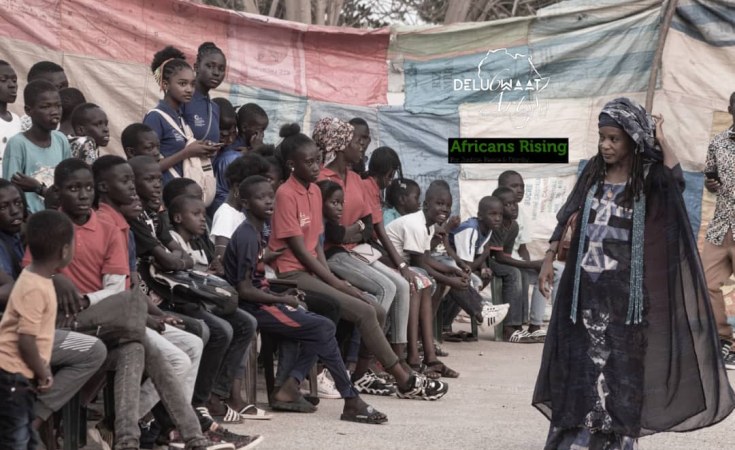I am passionate about South Africa despite its painful history: the horrors of Dutch colonization, the segregation that predated apartheid and the deep wound of the apartheid era and its crimes against humanity.
During this year's Day of the African Child, I joined a local Senegalese youth group called Delusiwaat Art and the International School of Popenguine in organizing a concert in the seaside village. As a coordinator of Africans Rising For Justice, Peace and Dignity, my contribution to the event was to educate the youth about the Soweto uprising and the role of young people in the final crumbling of South Africa's apartheid system.
I also joined the women's literacy class of the village of Ndayanne as they organized a conversation with children and parents about the importance of education for a better future. It was a joy to spotlight the stories of the children of Soweto and their fight for quality education in rural Senegal.
I was born and raised in West Africa, where I was taught in public school that apartheid was a crime against humanity. I was privileged enough to visit South Africa on several occasions, including when the World Conference on Racism and Xenophobia was held in Durban.
I am well aware of the endemic poverty that plagues the country, which is reflected in the striking fact that black people, representing over eighty percent of the population, still live in an economy dominated by whites and foreigners. The high rates of criminality and xenophobic attacks, as well as the rampant violence against women, trouble me deeply. To add to all these issues, the country is going into lockdown once again due to the third wave of COVID-19.
But I love and admire South Africa and hold a deep respect for its people. It is a country that has been able to tear down the formal machinery of an unjust system like apartheid despite all the challenges it faced from a myriad of internal and external interests determined to hinder movements for change.
For people fighting to change systems that seem impossible to move, the anti-apartheid struggle serves as an inspiration, a proof that we can win. It gives us hope as we continue to fight for the true liberation of our continent. South Africa reminds us of the importance of our work to stop the bleeding of our continent through illicit financial flows; to recuse the unjust debt that keeps us economically enslaved; and to break the unholy alliances of our governments with the multinationals that dispossess African people of our land and our rights.
South Africa's anti-apartheid struggle serves as an inspiration as we continue to fight for the true liberation of our continent.
The sentencing of former President Jacob Zuma, coupled with international calls to arrest the corruption-laden Gupta family, put South Africa among the nations boldly strengthening accountability and the rule of law. Justice seekers and lovers of peace around the world must celebrate this victory as we support the people of South Africa in their fight to maintain the integrity of their justice system.
While Zuma is finally facing justice for his misuse of power, the world must not forget that he has never been held accountable for the accusations brought against him by Fezekile Ntsukela Kuzwayo, a woman who accused him of rape in 2005 when he was the president of the ANC.
Zuma was acquitted of the charges in 2006 after a judge ruled that their encounter was consensual. I can't help but wonder: if women's voices were really heard, would Zuma have had the opportunity to misuse the South African government's resources?
This year, on International Women's Day (March 8), Africans Rising held a virtual day-long consultation in solidarity with the people of Senegal. We spoke with women who were dealing with the current reality of life in Senegal - there was violence on the streets and protests against the release of Ousmane Sonko, an opposition party member accused of rape by a young woman.
Members of the country's feminist movements were using all their powers and connections to ensure that the protests remained peaceful, while also supporting the demands of the young woman that Sonko remain in jail during an investigation to clarify what actually happened.
During our online meeting, I can remember clearly the voice of feminist Nancy Kachingwe, who cautioned us to learn from the experience of South Africa with Jacob Zuma by saying that a man who has raped women shouldn't be given the opportunity to abuse the entire population as president.
It is clear we didn't learn that lesson in 2005, but it is not too late to start now. Perhaps with Zuma's sentencing we are entering a new era in which political leaders who have abused our people or stolen our resources finally face legal consequences. Perhaps South Africa is breaking the mold of begrudging acceptance of our leaders' wrongdoings. Now the question is, who will follow their lead?
Coumba Toura is Co-Coordinator Africans Rising, a Pan-African movement of people and organisations working for peace, justice, and dignity.
RELATED: Senegal Has A Law Criminalizing Slavery - Here Is Why That Matters


